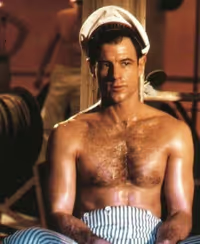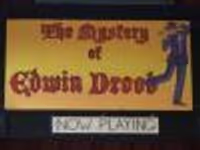First Rate Shows with Awful and/or Anti-Climatic Final Scene(s)
#25re: First Rate Shows with Awful and/or Anti-Climatic Final Scene(s)
Posted: 11/24/04 at 12:52pm
I kind of agree with the post about Wicked. They did a similar storyline in the book, but in the book it just made a lot more sense and was tied together a lot better I think.
Also in the book she actually does have an allergy to water. I was so confused when I was seeing Wicked and they have a scene with her standing out in the rain.
My mouth really did hit the floor with the fake death thing in the end. I was enjoying the show up until then, and I was suddenly like, WTF?!? The book implied she might still be alive somewhere, but it certainly didnt have her going off to vacation with her boyfriend.
#26re: First Rate Shows with Awful and/or Anti-Climatic Final Scene(s)
Posted: 11/24/04 at 1:16pm
I'm glad Margo reminded us of FOLLIES. Funny, I saw the original twice, and the Papermill, and the (dreary) Roundabout revival. I never can REMEMBER the damned ending -- it just trails off. I have a mental image of Alexis Smith, in the grand first staging, having to drop all of the Phyllis edge and look at John McMartin as though she's never had a bad day with this hollow man. It didn't ring true to my 19 year old eyes, and it seems especially false now.
Yes, Mrs. Goldman didn't allow Papermill to move across the river. I much preferred that version, and listen to that recording. Margo is correct -- the show needed a musical period on the evening, or some indication of catharsis.
The worst bad ending -- of an admittedly mediocre show -- is APPLAUSE. Margo (not the beloved poster) says something like "I've gotta go home and make lasagne!" And then must warble one of Charles Strouse's worst ditties, "Something Greater." Anyone doubting me, listen to the recording, the end not helped by Bacall's attempts to turn vowels into notes.
Interesting, the end of WOMAN OF THE YEAR is empty, too. The eleven o'clock spot is 'Grass is Always Greener,'but then Tess is left with a wet head and some awful number, rewritten for the road, but no improvement. "We're gonna Work it out!" was the title. Ugh.
#27re: First Rate Shows with Awful and/or Anti-Climatic Final Scene(s)
Posted: 11/24/04 at 1:25pmHow about Chess? I really enjoy this show, but it just doesn't seem like the ending is all that strong.
#28re: First Rate Shows with Awful and/or Anti-Climatic Final Scene(s)
Posted: 11/24/04 at 1:26pmFunny. I've never seen FOLLIES performed, but I have read the book and it doesn't necessarily ring false reading it....hmmmm.
apdarcey
Broadway Legend Joined: 6/10/04
#29re: First Rate Shows with Awful and/or Anti-Climatic Final Scene(s)
Posted: 11/24/04 at 1:40pmyou know, i've never seen follies, heard some of the music obviously... so all i have to go on is what you guys are saying... if fact, it sounds like the whole point of the show is to have this ending... if i understand margo's point correctly then even after all that these characters go through, and all the "truths" that they re-live and learn about, they still must go on with what they chose to do... that rings very true in the real world with the fact that we all make choices and may not like the consequences, we may even regret the consequences, but we still persevere because that's human nature... these characters might be unhappy or any other emotion, but they're going to keep moving... they are going to keep their life going... and if that means settling for something that is controversial or has a negative history then so be it... i would hope that this type of meaning especially speaks to all the hopeful actors on this board who do have to settle for a day job and can't always do what they love... sondheim does not right simple musicals, there are no easy stories or endings... to me, and again i've never actually seen the show, just basing it on what margo said, this sounds like sondheim's most real show... these actions and characters to be the most human in any of his shows... margo, if i'm wrong about this or didn't understand what you were trying to say then tell me about it... i'm here to learn! but i really did LOVE your use of sturm und drang... what a great term... oh music dorks, how i love them!
MargoChanning
Broadway Legend Joined: 4/5/04
#30re: First Rate Shows with Awful and/or Anti-Climatic Final Scene(s)
Posted: 11/24/04 at 2:19pmThat's really not it. The problem was that in the last half an hour of the show, the book went from Point A -- "I hate you, you bastard. I want a divorce!" to Point C (a moment later) -- "Come on, honey, let's go home" and they walk off arm in arm together, but Goldman never wrote a Point B -- a transitional scene that would dramatically justify how the couples got from A to C. While it's certainly possible that, as can happen in real life, the couples had a change of heart for some reason, the book doesn't bother to tell us how or why the two couples decide to reconcile. It just ....... happens -- a nonsensical tacked on deus ex machina ending that rings completely false psychologically and emotionally and undermines all that has occured before. A case of lazy, incomplete, incompetent dramaturgy that hurts what is otherwise a masterpiece.
apdarcey
Broadway Legend Joined: 6/10/04
#31re: First Rate Shows with Awful and/or Anti-Climatic Final Scene(s)
Posted: 11/24/04 at 3:31pmthanks margo, i guess i was confused before about the actual ending of the show... i thought it was more of a "let's cope with the circumstances" type thing, you know? thanks though...
Broadway Legend Joined: 12/31/69
#32re: First Rate Shows with Awful and/or Anti-Climatic Final Scene(s)
Posted: 11/24/04 at 3:43pmAs Much as I love and Adore Chess, I think that when I first saw it I thought what a lame ass ending. But then I saw it revived in California I loved the ending. And the way they made all the new changes work.
BWayBoy88
Broadway Legend Joined: 4/23/04
#33re: First Rate Shows with Awful and/or Anti-Climatic Final Scene(s)
Posted: 11/24/04 at 5:54pmAs much as I love the show, I think Pippin has a very anti-climatic ending. He refuses to do the finale, they take away the sets and costumes and then they just basically say "ok we are done." I was very happy in the chages they made in the show a few years ago at the Paper Mill. I felt the ending actually made sense and worked well.
#34re: First Rate Shows with Awful and/or Anti-Climatic Final Scene(s)
Posted: 11/24/04 at 6:03pm
Pippin has the stupidest ending ever.
#35re: First Rate Shows with Awful and/or Anti-Climatic Final Scene(s)
Posted: 11/24/04 at 7:51pmI love My Fair Lady and i was in My Fair Lady. The ending sucks.
apdarcey
Broadway Legend Joined: 6/10/04
#36re: First Rate Shows with Awful and/or Anti-Climatic Final Scene(s)
Posted: 11/24/04 at 7:53pmoh jesus... the whole point to pippin is the ending... the final line is the story... will anyone else back me up? this show would not be as great as it is (and i consider it one of the greatest) without it's ending...
#37re: First Rate Shows with Awful and/or Anti-Climatic Final Scene(s)
Posted: 11/26/04 at 10:48ambump
#38re: First Rate Shows with Awful and/or Anti-Climatic Final Scene(s)
Posted: 11/26/04 at 10:57am
Well, I'm sure the ending in the book versus the ending in the play are far different from each other, as the musical barely holds a candle to the actual story told in the book...
However.
Remember in "Wizard Of Oz"---it was the Scarecrow who handed the bucket of water to Dorothy in the first place. A loose connection, I know, but a connection. I'm sure Fiyero didn't want to risk being found out; all the more reason to continue the act until Dorothy has gone.
And as for the faked death, what with her being on stage and everyone singing about her. . .You can only do so much on stage and there are moments when you must engage your willing suspension of disbelief, understanding that the group is singing about her--and there that group is located, she is not. Yet, for the ending's sake, Elphaba must be seen--so, they work her in. I love moments like that, when two separate things are happening.
But, those are my two cents, take 'em or leave 'em. ![]()
Videos







